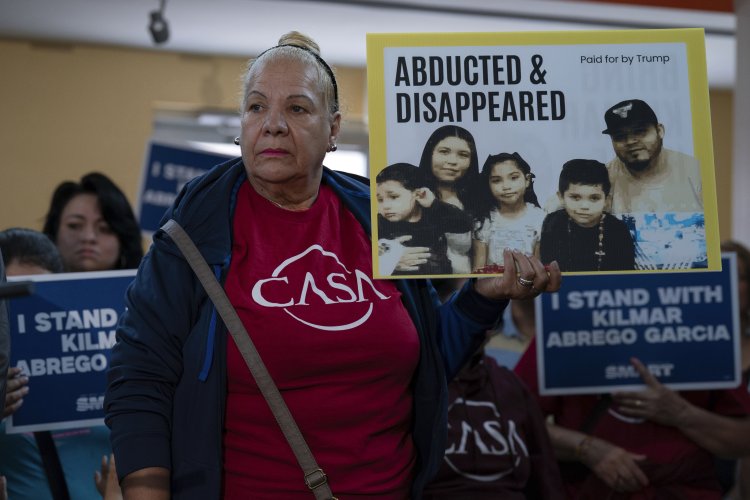Supreme Court orders Trump administration to 'facilitate' the return of mistakenly deported man to El Salvador
The justices rejected a petition to overturn a judge’s ruling that mandates U.S. officials to pursue the release and return of Kilmar Abrego Garcia.

The justices denied the administration’s plea to overturn a judge’s ruling requiring U.S. officials to work toward Abrego Garcia’s release and reinstatement in the U.S. This situation arose after he was sent to El Salvador despite a court order instructing that he not be deported there due to potential persecution from a local gang.
According to the Supreme Court, the judge’s order “properly requires the Government to ‘facilitate’ Abrego Garcia’s release from custody in El Salvador and to ensure that his case is handled as it would have been had he not been improperly sent to El Salvador.”
Although the high court’s ruling does not explicitly state that it mandates bringing Abrego Garcia back to the U.S., it upholds the majority of U.S. District Judge Paula Xinis’ order which explicitly calls for his “return” to the United States.
This decision is a notable rejection of the Trump administration’s assertion that it had no power—and thus could not be compelled—to address its acknowledged mistake. It follows closely on the heels of a ruling in which the justices determined that the administration must allow due process for other foreign nationals whom President Donald Trump has sought to deport quickly under infrequently used war powers.
The implications of Thursday’s ruling could extend beyond Abrego Garcia’s individual case. He was deported on a controversial series of flights that also included around 130 Venezuelan men who were expelled from the U.S. after Trump invoked the Alien Enemies Act of 1798 against alleged members of the Tren de Aragua gang.
The new decision signals that individuals who believe they were wrongfully deported from the U.S. can continue to seek remedies in U.S. courts. This could pave the way for legal challenges from those deported to El Salvador under the wartime statute who are currently confined in a notoriously harsh anti-terrorism prison.
Earlier in the week, the justices issued a parallel ruling indicating that any future attempts by the administration to swiftly deport Venezuelan nationals must allow them the opportunity to contest claims of gang affiliation. However, that ruling did not address the situation of the roughly 130 men who had already been sent to El Salvador without due process.
This ruling arrives as El Salvador’s president, Nayib Bukele, is scheduled to visit the White House to discuss the country’s agreement to accept U.S. deportees.
In their two-page decision, the justices also stipulated that the Trump administration must “be prepared to share” further details about its handling of Abrego Garcia’s situation and any efforts made—or planned—to secure his return.
However, the court instructed Judge Xinis to consider the “due regard for the deference owed to the Executive Branch in the conduct of foreign affairs” as she clarifies a provision in her order that mandated the U.S. government to “effectuate” Abrego Garcia’s release.
On Friday, Judge Xinis ruled that Abrego Garcia’s deportation was unlawful and instructed the Trump administration to arrange for his return to the U.S. by midnight the following Monday. Just hours before that deadline, Chief Justice John Roberts stayed the order to allow the Supreme Court time to review the case. In its Thursday decision, the court noted that the deadline has since expired and is “no longer effective.”
Justice Department officials contended that it was “impossible” for them to comply with the order, partly because Abrego Garcia, having been born in El Salvador, is now in that country's custody. They also claimed that Xinis’ directive infringed on the Constitution by encroaching on presidential powers concerning foreign relations and national security.
The administration’s handling of the case sparked outrage from immigration advocates, who argued that its reluctance to take steps to facilitate Abrego Garcia’s return indicated that both foreigners and U.S. citizens could face erroneous deportation with no legal recourse.
The court’s liberal justices stressed this point in a concurrent opinion. “The Government’s argument … implies that it could deport and incarcerate any person, including U.S. citizens, without legal consequence, so long as it does so before a court can intervene,” Justice Sonia Sotomayor wrote, joined by Justices Elena Kagan and Ketanji Brown Jackson. “That view refutes itself.”
The liberal justices stated they would have both “denied” the government’s request for relief from Judge Xinis’ order outright.
Abrego Garcia entered the U.S. illegally around 2011 and has resided in Maryland for over a decade. He was arrested in 2019 in a Home Depot parking facility but never faced any criminal charges. Immigration officials initiated deportation proceedings against him after local police flagged him as a suspected member of the MS-13 gang based on informant claims and his clothing choices, which included a Chicago Bulls hat and hoodie. Abrego Garcia has denied any involvement with MS-13 or other gangs.
Despite having denied his asylum claim in 2019, an immigration judge prohibited his return to El Salvador due to fears of persecution from the Barrio 18 gang, which he alleged had been extorting his family’s pupusa business. This order remained valid when he was arrested on March 12, with Immigration and Customs Enforcement swiftly transferring him to a detention center in Texas, where many detainees were held. On March 15, he was deported to El Salvador, landing in the CECOT anti-terrorism prison.
Prior to Judge Xinis’ ruling, White House press secretary Karoline Leavitt labeled Abrego Garcia a member of the “brutal and vicious” MS-13 gang and asserted he “will not be returning to our country.” However, the judge noted that the government had failed to provide evidence substantiating his alleged gang affiliation and essentially abandoned that claim. The Justice Department attorney who presented the case, Erez Reuveni, has since been suspended for expressing frustration over the administration’s stance. Attorney General Pam Bondi criticized him for what she described as a lack of fervor in arguing the government’s position.
Officials have not provided a detailed explanation for Abrego Garcia’s deportation to a country from which an immigration judge had barred his return, describing it variously as an “administrative error” or “clerical error.” However, the administration’s acknowledged mistake was central to recent judicial decisions that prevented it from summarily deporting Venezuelan nationals under Trump’s authority to categorize them as “alien enemies.”
Rohan Mehta for TROIB News












